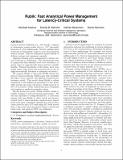Rubik: fast analytical power management for latency-critical systems
Author(s)
Kasture, Harshad; Bartolini, Davide Basilio; Beckmann, Nathan Zachary; Sanchez, Daniel
DownloadSanchez_Rubik.pdf (1.227Mb)
OPEN_ACCESS_POLICY
Open Access Policy
Creative Commons Attribution-Noncommercial-Share Alike
Terms of use
Metadata
Show full item recordAbstract
Latency-critical workloads (e.g., web search), common in datacenters, require stable tail (e.g., 95th percentile) latencies of a few milliseconds. Servers running these workloads are kept lightly loaded to meet these stringent latency targets. This low utilization wastes billions of dollars in energy and equipment annually.
Applying dynamic power management to latency-critical workloads is challenging. The fundamental issue is coping with their inherent short-term variability: requests arrive at unpredictable times and have variable lengths. Without knowledge of the future, prior techniques either adapt slowly and conservatively or rely on application-specific heuristics to maintain tail latency.
We propose Rubik, a fine-grain DVFS scheme for latency-critical workloads. Rubik copes with variability through a novel, general, and efficient statistical performance model. This model allows Rubik to adjust frequencies at sub-millisecond granularity to save power while meeting the target tail latency. Rubik saves up to 66% of core power, widely outperforms prior techniques, and requires no application-specific tuning.
Beyond saving core power, Rubik robustly adapts to sudden changes in load and system performance. We use this capability to design RubikColoc, a colocation scheme that uses Rubik to allow batch and latency-critical work to share hardware resources more aggressively than prior techniques. RubikColoc reduces datacenter power by up to 31% while using 41% fewer servers than a datacenter that segregates latency-critical and batch work, and achieves 100% core utilization.
Date issued
2015-12Department
Massachusetts Institute of Technology. Computer Science and Artificial Intelligence Laboratory; Massachusetts Institute of Technology. Department of Electrical Engineering and Computer ScienceJournal
Proceedings of the 48th International Symposium on Microarchitecture (MICRO-48)
Publisher
Association for Computing Machinery (ACM)
Citation
Kasture, Harshad, et al. “Rubik: fast analytical power management for latency-critical systems.” Proceedings of the 48th International Symposium on Microarchitecture (MICRO-48), December 5-9 2015, Waikiki, Hawaii, USA, Association for Computing Machinery (ACM), December 2015 © 2015 Association for Computing Machinery (ACM)
Version: Author's final manuscript
ISSN
978-1-4503-4034-2